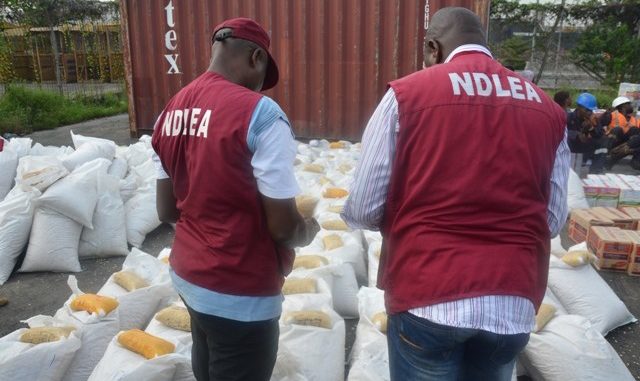
As insecurity and criminality engulf Nigeria, the tenacity with which the National Drug Law Enforcement Agency (NDLEA) is pursuing drug traffickers is instructive, given that illicit drugs, apart from its massive damaging potential on individual persons, is also a motivating element for the arms-wielding gunmen causing most of the mayhem. The agency’s drive is akin to looking beyond the obvious to unravel criminality in all its ramifications. It should be deemed to be a critical complement of the war against insurgency, terrorism, banditry, kidnapping and cultism among other heinous crimes.
And if the NDLEA’s recent discoveries are anything to flaunt, Nigerians should be worried at the large extent of illicit drug trafficking. The agency has lately been making major arrests on almost daily basis of individuals attempting to ferry in or out dangerous illicit drugs. The findings become worrisome considering the possibility that more than a few traffickers could have escaped the drug net. Ultimately, the drug battle must be seen as a multi-dimensional holistic process of which the NDLEA onslaught is only one aspect, though a crucial one.
Among the agency’s more recent clampdown are its interception of 834.5kg illicit drugs en-route U.S. in Lagos and the arrest of two persons for allegedly trafficking 191 pellets of heroin and cocaine via the Murtala Muhammed International Airport, Lagos. About the same time, the agency caught a number of traffickers including Spain-bound trafficker, who excreted 113 wraps of cocaine after his arrest at same airport; another person was placed under excretion observation and in the process, excreted 92 pellets of Heroin with a total weight of 1.300kg. On April 12 operatives made a seizure of 11.550kg of heroin which was cleverly packed and concealed in cornflakes cartons. Also, a Congolese was arrested, following sting operations by the agency which led to the arrest of some other suspects, one of whom excreted 99 wraps of cocaine.
Before then Brig. General Mohammed Buba Marwa, chairman/Chief executive Officer of NDLEA, had lamented that 90 per cent of criminalities in Nigeria is linked to drug abuse; a few days afterwards, the NDLEA intercepted a container load of Tramadol at the Apapa seaport in Lagos.
This seizure of tramadol, a painkiller, is a pointer that the opioid is available in the illicit market; and its availability may also be fuelling widespread drug addiction. Tramadol, an opioid analgesic prescribed to treat moderately severe pain can be dangerous when its use is not controlled. It is suspected to be at the heart of Nigeria’s drug problem, because it is the rave for recreational drug users.
Marwa’s subsequent assertion that “90 per cent of criminalities in Nigeria today, ranging from banditry to insurgency, kidnapping, rape and others, is linked to use of illicit drugs” is hardly surprising. Other social consequences include school dropout, cultism, violence, armed robbery, lawlessness, cultural disorientation, assassinations, loss of productivity, among other significant damage to the body and internal organs.
Drug abuse alone may not be solely responsible for criminality in the country; as it may also be traced to the social crises of youth unemployment and under-employment, leading to frustration among the youths. However, the phenomenon of crime will continue to be a concern until is tackled headlong, beyond the influence of drugs such as addressing increasing caused by the absence of fairness, equity and justice. Idleness is a recipe for crime. Thus, the country needs a secure environment for local investments to thrive and to attract direct foreign investments, which will lead to more employment for the youth.
Therefore, drugs seizure by Customs brokers and the NDLEA should be treated as a first step in addressing the problem because it will not deter the traffickers and users. A comprehensive prevention strategy is one that seeks to tackle this problem from various angles that will yield both short and long-term results. Essentially, effective drug-abuse control requires evidence-based supply chain management from the source country and the destination country, public enlightenment, engagement and monitoring of dispensing outlets and withdrawal management and rehabilitation of addicts.
Beyond the seizure, government should improve the regulation and enforcement of existing regulations on sales of medications, especially in the open markets in Nigeria while experts need to carefully assess patients’ legitimate clinical needs for opioids, to ensure that these drugs do not get into the wrong hands.
Again, given the low-risk perception of the dangers of drug abuse, the Health Ministry and the National Drug Law Enforcement Agency (NDLEA) should work in collaboration with the United Nations Office on Drugs and Crime (UNODC) to design a good communication strategy focusing on the dangers of drug abuse, and saturating the airwaves and public spaces with anti drug abuse messaging. At the family level, parents should create enough time to attend to the needs of their children and guide them properly to adulthood; while at the community level, religious leaders should sermonise on the ills of drugabuse.
In addition, the lifestyles of Nigerians, especially with respect to self-medication based on ignorance, poverty, poor access to quality health care services, requires attention. The Federal Ministry of Health, State Ministries of Health, NAFDAC, health-related non-governmental organisations (NGOs), the Pharmaceutical Society of Nigeria (PSN) should educate Nigerians on the dangers of drug abuse. Every pharmaceutical store should have resident pharmacists who should ask for prescription before dispensing drugs and educate patients about any drug.
The race to rid the nation of drug abuse is a marathon, not a sprint; government should not expect one-stop answers to such an entrenched problem.
END

Be the first to comment